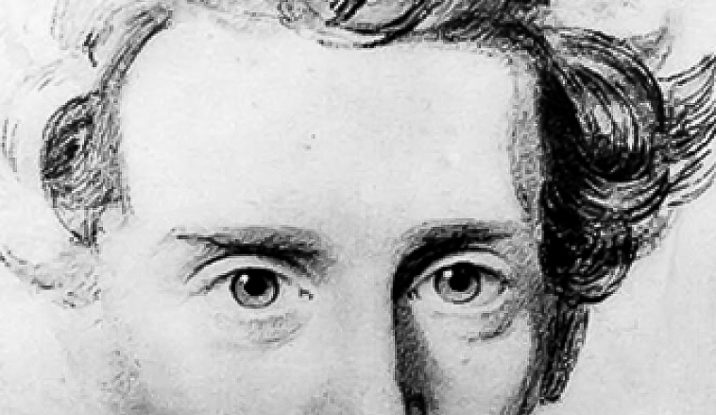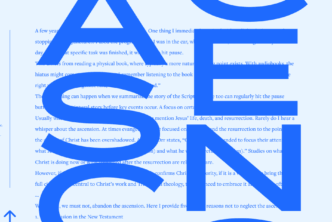Editor’s Note: We recently invited Dr. Mark Tietjen to contribute a series of articles on Søren Kierkegaard, to celebrate the soon-to-be released 26-volume Kierkegaard’s Writings on the Logos Digital Library. This is a monumental occasion, given that it has taken 50 years for Kierkegaard’s entire corpus of writings to be translated into English. In this first essay, Tietjen writes with graceful prose and keen insight into the meaning and implications of one of Kierkegaard’s most famous (and misused) ideas: the “leap of faith.”
Introduction
A sense of liberation, an open invitation, a joy-giving adventure—these phrases describe my response to an idea my college mentor, the late Dr. Daniel Goodman, pitched to those listening to him in chapel sometime in the mid-1990s at Palm Beach Atlantic University, then College. The idea was drawn from an image found on his office wall. A beloved New Testament professor, Dr. Goodman described a cross that hung on his wall and something that hung on the cross: a tassel from his doctoral graduation cap. Dr. Goodman intended the image to convey a way of thinking about faith and about academic inquiry where those two pursuits were conceived as compatible and consistent forms of thoughtfulness about the world and our place in it.
That image primed me for falling in love with the intellectually rigorous and faithful thought of Søren Kierkegaard. In this and other blogs to follow, I hope to point to a few places where Kierkegaard does the very helpful work of challenging not simply our minds to contemplate the divine or some doctrine about the divine, but rather challenges our whole being to faithful Christian existence. Much like St. Augustine, Kierkegaard—perhaps through personal experience—recognizes the seductive lure of a kind of self-deception unique to the academic mindset, the practice of endless theorizing or philosophizing that keeps personal response, application, and obedience at bay. As I have discovered myself, reading Kierkegaard in the right way (what Kierkegaard scholars often spend most of their time fighting about) can be an experiment in a kind of self-imposed pain common to sanctification since Kierkegaard’s hope, as he puts it, is to make it difficult to be a Christian, though no more difficult than it actually is.
The way I wish to get at the challenges that Kierkegaard poses to his reader, to you and to me, comes through a set of ideas, phrases, epithets one thinks of when Kierkegaard’s name is invoked at a dinner party or during a freshman philosophy class. These would include things like “leap of faith,” “subjective truth,” or “father of existentialism.” I will argue that these and other terms are often misapplied when described of Kierkegaard or, in the least, misunderstood when properly applied.
The Leap of Faith
Let’s begin with the idea of the leap of faith. It might be useful to start with a simple fact, which is that Kierkegaard never uses this phrase in his published writings. This is remarkable since ‘leap of faith’ is the phrase with which he is most associated. The obvious connotation of this phrase is that religious faith is a blind leap, a close-your-eyes kind of moment or series of moments where, in the face of insufficient evidence, you somehow trust God with your life anyway. Both lay philosophers who’ve published on Kierkegaard and professional philosophers including, most notably, Alasdair MacIntyre, have run with the idea that Kierkegaard is an enemy of reason, that with him we begin a descent into an utter mistrust of rational capacities which leaves religion a choice that can only be made in spite of good reason, not according to it.
Of course there is no question that some if not many religious people hold to their faith in ways others might describe as blind, irrational, and therefore irresponsible, whether believing simply because it’s what you do if you belong to a certain culture, or whether believing with a mistrustful eye toward the intellectual life –very often the claims of modern science. But it’s less clear that all religious beliefs are or need to be held this way; both the western university and modern science emerged in cultures rooted in rigorously intellectual religious faith.
But back to Kierkegaard and his specific audience of 19th century European Christians. That audience was very familiar with Christian doctrine, arguably too familiar, so that the very category “Christian” had come to mean little more than “born in Denmark,” etc. Kierkegaard once remarked that becoming a Christian in his day was about as difficult as putting on a pair of socks. Of course one had to go through confirmation, etc. but religion was largely understood as a series of doctrines to which one nominally assents. And unless you vehemently dissented from such teachings, you were a Christian. Put another way, Christianity was the default setting of one’s religious identity, and the quality of “Christianity” was primarily doxastic in nature.
Such a conception of Christianity was deeply mistaken, Kierkegaard thought, because the background philosophical anthropology undergirding the concept was deeply mistaken. Humans may be rational animals or thinking things as the philosophers have taught, but they are much more than this, and Christianity acknowledges as much. The central obligation of Christian existence, after all, is not to affirm the existence of God, but to love God. Love is a passional category without which a human cannot flourish. When elucidating Christianity Kierkegaard would describe the faith as both “dialectical”—concerning truth claims—but also “pathos-filled”—the kind of thing that engages humans at an emotional or heart level.
The conversion of St. Augustine illustrates that one cannot conflate the intellectual and passional aspects of the Christian faith and get it right. His Confessions testifies to not one, but a series of conversions, only some of which are of the intellect. Augustine found the conversion of his passions—his will, his desires—far more difficult than the conversion of his intellect. “Lord give me chastity, but not yet.” That’s the statement of someone who knows what is right but its veracity has not made its way all the way down. Biblical Christianity insists that the Good News is not the kind of news that leaves a heart and will unchanged, but rather finds its way into every nook and cranny of a human life. The restorative “way” that Jesus offers to his interlocutors in scripture is holistic; he seeks their physical, intellectual, moral, spiritual, and emotional well-being.
Returning to the concept of the leap of faith, Kierkegaard thinks the church has long been guilty of over-intellectualizing Christianity. He lays much blame on the medievals, though of course Protestants killed other Protestants over theological disputes about baptism. Because Christian faith has become less about transformed existence and more about correct doctrine, Christians frequently misunderstand how one becomes a Christian. No, Kierkegaard, contests, conversion is not primarily through the assent of doctrines about Jesus even though it includes that. Rather, it occurs through a deeply-rooted, ever growing trust in those claims. It is similar to the trust required of a person learning to swim. Even if the would-be swimmer has read books about each stroke, been given instruction by an Olympian swimmer, and can recount the importance of efficient breathing techniques, this person cannot learn to swim without plunging into the water.
So, too, does Kierkegaard advocate a leap, not out of reason or against reason (the swimmer has done some intellectual preparation), but recognizing that forward movement in life is not primarily a function of our rational capacities but our will and our trust. Forward movement in faith is also the product of a decision and choice. While you can inherit your parents’ looks and money, you cannot inherit their faith, as it is a spiritual category. Kierkegaard is fond of sayings like, “every generation must begin anew.”
So yes, Kierkegaard affirms a leap, not because the would-be believer doesn’t have sufficient evidence to leap, but simply because faith cannot be reduced to an intellectual test one passes via assent. No, faith is rooted in passion, in one’s cares and concerns. In entrusting one’s life to God, faith’s movement forward requires a decision each individual must make for him or herself.
The entire corpus of Kierkegaard’s writings is now available on Logos. Princeton University Press has worked for over 50 years to translate all of the famous Danish philosopher’s works into English, and they are now ready to be read, researched, and discussed in a fully searchable digital format.
The 26-volume Writings is under development in pre-pub, which means the price goes up soon. I encourage you to get your hands on this rich collection of thought from one of the greatest philosophers of all time. Own and read the definitive writings of the inimitable Søren Kierkegaard.
Related articles
- 70 Bible Verses on All-Important Faith
- Logos Bible Study App: What It Is and Why It’s the Best Choice for You






